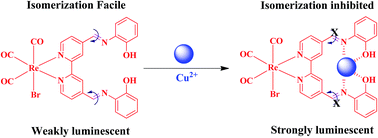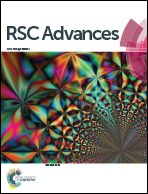Synthesis and characterization of monometallic rhenium(i) complexes and their application as selective sensors for copper(ii) ions†
Abstract
Novel imine functionalized monometallic rhenium(I) polypyridine complexes (1–4) comprising two phenol moieties attached to 2,2′-bipyridine ligands L1–L4 have been synthesized and characterized. These complexes exhibit selective and sensitive detection towards copper(II) ions and this is observed through changes in UV-visible absorption, luminescence and time-resolved spectroscopic techniques. An enormous enhancement is observed in emission intensity, quantum yield and luminescence lifetime with the addition of copper(II) ions, and this can be attributed to the restriction of C![[double bond, length as m-dash]](https://www.rsc.org/images/entities/char_e001.gif) N isomerization in the Re(I) complexes. The strong binding between copper(II) ions and these complexes reveals that the binding constant values are in the range of 1.1 × 103–6.0 × 103 M−1. The absorption spectral behavior of the complexes is supported by DFT calculations.
N isomerization in the Re(I) complexes. The strong binding between copper(II) ions and these complexes reveals that the binding constant values are in the range of 1.1 × 103–6.0 × 103 M−1. The absorption spectral behavior of the complexes is supported by DFT calculations.


 Please wait while we load your content...
Please wait while we load your content...